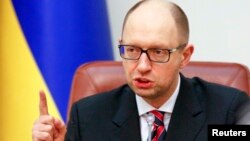Ukraine will conduct audits of state companies with a view to selling stakes on international markets, Prime Minister Arseny Yatseniuk said on Tuesday, as part of the new government's drive to reform corrupt and inefficient state institutions.
Around 1,500 state firms cannot be privatized by law at present, but the Kyiv government will recommend abolishing this rule for 1,200 in an effort to stamp out graft, Yatseniuk said at a government meeting.
“Opaque state firms spend billions without any system of control with a management appointed on a political basis ... State companies have essentially fallen into the private hands of one political group or another,” he said.
Kyiv is under pressure to reform state-controlled energy concern Naftogaz, whose financial deficit of 110 billion hryvnia ($7.1 billion) is three times larger than the national budget deficit partly due to a complicated system of subsidies.
“We will introduce a mechanism of auditing all state companies according to international standards and to sell stakes on international markets,” Yatseniuk said.
His comments echoed those by a representative of Ukrainian President Petro Poroshenko in London, who called for Naftogaz to be privatized.
Naftogaz subsidies are “skyrocketing” and costing the state around 10 times the budget for the army, Dmytro Shymkiv, the president's deputy chief of staff, said at a Ukraine Investment conference on Tuesday.
Yatseniuk said the government would change the gas subsidy system to match market standards. “We will raise all energy prices and tariffs to the market level,” he said.
Further price rises will be deeply unpopular in Ukraine. After a year of political upheaval and a separatist revolt in the east, Ukrainians face a winter in poverty with prices rising sharply, the currency crumbling and a nearly bankrupt state dependent on foreign aid and in no position to offer any help.
The government has already increased consumer gas prices by 50 percent this year. But this has failed to make a difference to Naftogaz's bottom line due to the expense of buying foreign gas when the national hryvnia currency is near all-time lows.





